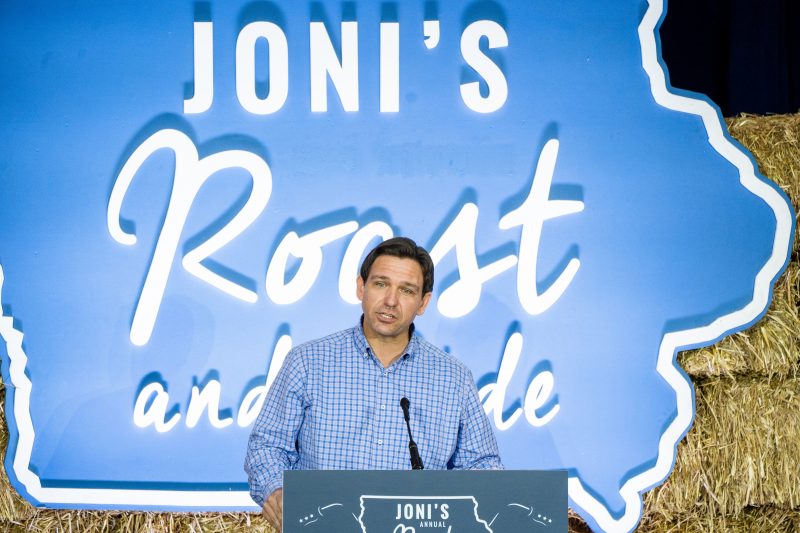
The era of soft-pedaling Donald Trump in Republican politics is coming to an end.
His former White House apostle Mike Pence launched a presidential campaign Wednesday by declaring that voters cannot logically support Trump and the Constitution at the same time. Florida Gov. Ron DeSantis said Monday that a vote to nominate Trump will probably just reelect President Biden, because the former president has alienated so many voters in states such as Georgia.
Former New Jersey governor Chris Christie got into the race Tuesday in New Hampshire by calling Trump a “lonely, self-consumed, self-serving mirror hog” and accusing Trump’s whole family of grifting.
“That’s your money he stole and gave it to his family,” Christie said of the billions in investments Trump’s son-in-law Jared Kushner secured from the Saudi royal family after leaving the White House. “You know what that makes us? A banana republic.”
The harsh turn comes after a six-month presidential pregame period, when Trump rivals largely tried to introduce themselves with positive, biographical messages, only to see Trump solidify his standing in national polls. The book tours, town halls and more than $20 million in positive advertising by rivals have yet to dent the party’s attachment to its former president, who is still viewed favorably by 86 percent of Republicans, according to a recent Quinnipiac University poll.
All the noise has only strengthened Trump and his defiant political style, according to his advisers. They argue that there is clear evidence that attacks on Trump only rally GOP support for him, pointing to the increased backing from Republicans after an New York indictment on charges of falsifying business records to conceal an extramarital sexual encounter and the finding by a civil jury that he was liable for the sexual abuse of another woman in a department store dressing room.
On Thursday night, Trump said in a post on his Truth Social site that he has been charged by the Justice Department in connection with the discovery that hundreds of classified documents were taken to his Mar-a-Lago home after he left the White House. He has been ordered to appear in federal court in Miami on Tuesday, he said.
Two candidates with echoing slogans and pugnacious profiles — Trump and DeSantis — together claimed about 75 percent of the Republican vote at the start of the year, while all the other candidates teetered on the single-digit cusp of a rounding error or hardly registered at all.
The same is true today, according to the RealClearPolitics average of national polls. The only change is how DeSantis and Trump divide their three-quarters share of the electorate: Once it was nearly evenly split, with a slight edge to Trump. Now Trump has about twice as much support as DeSantis.
“We don’t have a lane, we have a highway, and everybody wants to get on the road with us. What we are driving is an 18-wheeler, and [DeSantis] is in a gold-plated VW,” said Chris LaCivita, a top adviser to Trump’s campaign.
DeSantis campaign official Andrew Romeo retorted by saying that “Trump may have an 18-wheeler, but it doesn’t run like it used to. It can only make left turns these days,” an allusion to the Florida governor’s assertions that the former president has become less conservative.
Trump has survived a long and turbulent career in the public eye with a reputation as “Teflon Don” — impervious to attacks as he demolishes his opponents. But several Republican strategists opposing the former president said the new lines of attack from Pence, Christie and DeSantis could reshape the race. Republican voters, they noted, are not used to hearing criticisms of Trump from members of their own party who — in the case of Pence and Christie — worked intimately with him and observed him up close for years behind closed doors.
“You’re going to see a lot more specificity in the various kinds of critiques of Trump — whether it’s at a policy level, his personality, his style or his tone — and as these candidates push back on Trump, it’s going to take on the death-by-a-thousand-cuts approach,” said longtime Republican strategist David Kochel. “The breadth of the attacks against him, I think, will have a cumulative effect.”
There is also historical reason to believe that the current polling dynamics do not reflect the way the race will look on the eve of next year’s primaries and caucuses. Presidential nomination fights tend to break late. The 2008 Republican nominee, John McCain, did not lead in national polls until after winning the New Hampshire primary. The 2012 GOP nominee, Mitt Romney, trailed four different candidates in national polling at different points in that campaign. Many voters in Iowa and New Hampshire famously make up their minds within the final days before the contests.
Mike Murphy, a Republican presidential consultant who advised the presidential efforts of McCain, Romney and Jeb Bush, said most political consultants refer to the “Milt Gwirtzman rule,” named for the late adviser to John, Robert and Edward Kennedy: National polls don’t mean much until after the first primary.
“The reporting, punditry and wisdom-making machine is on a very different time frame than the primary voters,” Murphy said. “Primaries can have much more violent late swings than general elections.”
Complicating things further is the math facing Trump, who has a strong base of support in the party but is challenged by polls showing that many Republicans are open to choosing someone else and a large share would prefer a new nominee.
Trump has responded by praising many of his weaker rivals while fiercely attacking DeSantis. He recently called Pence a “good man,” wished Sen. Tim Scott (R-S.C.) “good luck” on his campaign and said he was “pleased to see” that businessman Vivek Ramaswamy was doing so well.
“I like those people very much,” Trump said of some of his lesser opponents in a recent interview on an Iowa talk radio show.
Like Scott — who has so far tried to rise above verbal fisticuffs with Trump — former U.N. ambassador Nikki Haley has taken aim at DeSantis for his similarities to Trump, while mostly avoiding direct engagement with the former president.
“Nikki agrees with many of Donald Trump’s policies, but she differs from Trump and DeSantis’s chaotic approach,” said Nachama Soloveichik, a Haley spokeswoman. “Her leadership style is why she was so effective in advancing strong conservative policies.”
Ramaswamy has also tried to cast a more subtle stylistic contrast with Trump. “I will take the ‘America First’ agenda further than Trump did, in part because I’m doing it based on moral authority and first principles rather than vengeance and grievance,” he said in a recent interview with The Washington Post.
Former Arkansas governor Asa Hutchinson, who has struggled so far to find much traction in the GOP field, has gone further than his rivals in calling for Trump to “step aside” because he is a target of the ongoing Justice Department criminal investigation into the mishandling of classified documents. He has also asked the Republican National Committee to make clear that GOP candidates have no obligation to support the party’s nominee if that person is “found guilty of espionage or a serious felony.”
Kevin Madden, a former adviser to Romney, said that any candidate who takes the view that Trump is “someone else’s problem” failed to understand the lessons of the 2016 campaign, when his opponents tried to demolish one another’s candidacies instead of Trump’s.
“If you think someone is going to go out and do the job against Trump for you, then you already have a flawed strategy,” Madden said. “You have to take on Trump sooner or later. Are you going to do it on your terms or are you going to do it on Trump’s terms?”
A political strategist for one presidential effort, who spoke on the condition of anonymity to discuss strategy, said there is a clear appetite in the party for an alternative to Trump. A successful challenger just needs to show that he or she is up to the challenge.
“You actually don’t have to fight Trump. You just have stand up to him,” this person said. “… We have half the electorate that wants to move on. He’s got half the electorate that really loves him, but a third of them would consider another option.”
The attacks from Pence and his allies this week were particularly striking, because he spent so many years as Trump’s obsequious second-in-command. The super PAC supporting Pence put out an ad Thursday hitting Trump for failing “the test of leadership” both during the Jan. 6, 2021, attack on the U.S. Capitol and after.
Scott Reed, the co-chair of the Committed to America PAC, said the group viewed “the formula for effectively taking it to Trump” as drawing sharp contrasts on leadership, but also on policy and lack of fealty to conservative principles.
“By the time we get to Iowa, Pence will be positioned as the conservative alternative to Trump,” Reed said. “We’re not just going to be wildly slinging insults about Trump’s children. Our approach is the nuts and bolts of taking it to him on his policy record post-election — and only Pence has the credibility to do this in a way no one else in the field does.”
Among the 2024 Republican primary field, Pence also faces the unique task of touting his time as vice president under Trump while also arguing that the country needs to move on from his former boss. During a stop Thursday at a Pizza Ranch in Waukee, Iowa, Pence reiterated his call for “new leadership in the Republican Party” and said he wanted to address Jan. 6 “head-on.”
“I was always loyal to President Donald Trump right up until the time my oath to the Constitution required me to do otherwise,” Pence said, adding that people in Iowa had thanked him in the past 24 hours for explaining his resistance to Trump’s efforts to overturn the 2020 election results.
The DeSantis campaign faced a backlash Thursday after tweeting out a digital video from the DeSantis War Room account targeting Trump for not firing Anthony S. Fauci, the former director of the National Institute of Allergy and Infectious Diseases who led efforts to combat the coronavirus pandemic. The video included fake images of Trump and Fauci hugging that appeared to be generated by artificial intelligence. Trump and his allies have also used doctored images to attack opponents.
As for Pence, Kelley Koch, chair of the Republican Party of Dallas County in Iowa, acknowledged he “took some swipes, a couple more direct than other candidates have done” at Trump. But she added: “I don’t know how that’s going to go. Iowa … we are really like nice people, we don’t like people pounding on other people.”
As he faces legal jeopardy in multiple jurisdictions, Trump has also demonstrated unique skill in generating support and sympathy from Republican voters with his claims that he is a victim of unjust political persecution — making the potential legal developments a wild card that could reshape the race at any moment this year.
Whit Ayres, a Republican pollster, said we don’t know “what the impact of those indictments will be or just how persuasive those indictments will be. We don’t know what kind of campaigns these candidates will run. A lot of times the front-runner doesn’t end up with the nomination.”


Comments are closed.